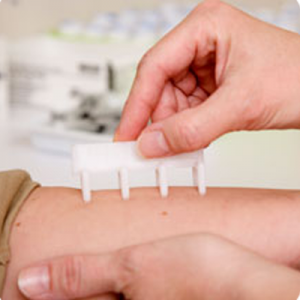 Before moving on to testing to confirm allergic disease other causes for symptoms should be investigated. Vasomotor rhinitis, for example, often presents with the same symptoms as allergic rhinitis but the symptoms are caused by a physical obstruction or deformity and not an allergic reaction. Once other causes are eliminated and a diagnosis of asthma, rhinitis, anaphylaxis or other allergic disease is made there are tests that can be done to determine the specific causative agent. Specifically there are skin tests and blood tests to be performed by an Allergist.
Before moving on to testing to confirm allergic disease other causes for symptoms should be investigated. Vasomotor rhinitis, for example, often presents with the same symptoms as allergic rhinitis but the symptoms are caused by a physical obstruction or deformity and not an allergic reaction. Once other causes are eliminated and a diagnosis of asthma, rhinitis, anaphylaxis or other allergic disease is made there are tests that can be done to determine the specific causative agent. Specifically there are skin tests and blood tests to be performed by an Allergist.
The skin tests are often known as prick or puncture testing. An area on the forearm or back is selected and marked with a pen or dye that itself won’t cause an allergic response. Then small amounts of the suspected allergens or extracts of the allergens are introduced to these areas and a puncture or prick is made in the skin. Sometimes the allergens are injected directly into the skin. After 30 minutes the body’s reactions to the allergens is observed and a determination is made on which allergen is causing the patient’s symptoms and the severity of their allergy. Skin tests are not as effective for those who have skin disease or have recently taken antihistamines.
Blood testing involves the measurement of IgE levels in a sample of the patient’s blood. Using radiometric, colormetric, and fluorometric tests to determine simply whether or not a patient is allergic to a particular allergen. The tests don’t determine severity of the reaction just if there is an allergic reaction or not. Blood tests have been shown to have approximately a 70% positive predictive value in large studies.


No Comments